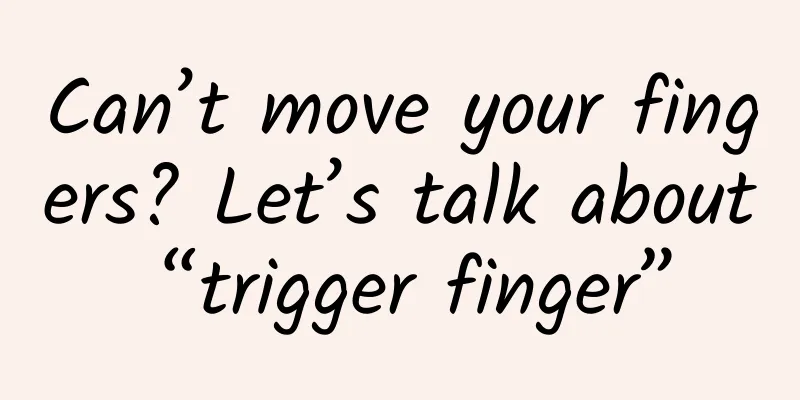Can’t move your fingers? Let’s talk about “trigger finger”

|
1. What is trigger finger? Trigger finger is also called snapping finger, clinically known as stenosing tenosynovitis, which is a chronic aseptic inflammation of the tendon sheath caused by mechanical friction. Due to the thickening of the tendon sheath, the flexor tendon sheath becomes relatively narrow, causing symptoms of clicking or jamming when the finger is bent or straightened, accompanied by local pain and limited joint movement. 2. Who is most likely to suffer from trigger finger? Trigger finger is common in middle-aged and elderly women, light industrial workers, and orchestral instrument players who use their fingers for a long time, quickly, and excessively. The most common occurrence is flexor pollicis longus tendinitis, which is called snapping thumb. 3. What are the clinical manifestations of trigger finger? 1. Initially, the affected finger will feel stiff and painful, which may worsen in the morning or after work and disappear after slow movement. 2. During physical examination, a nodular mass can be felt at the distal transverse palmar crease. When the fingers are flexed and extended, the nodular mass can be felt sliding, which may be accompanied by a bouncing sensation, and sometimes a more obvious snapping sound. 3. As the disease progresses, snapping sounds and pain gradually appear, and movement is slightly restricted. In severe cases, the fingers cannot be actively flexed, or are locked in the flexed position and cannot be straightened. 4. How to treat trigger finger? 1. General treatment: Adjustment of hand movements, finger splint fixation, auxiliary physical therapy, etc., and short-term use of non-steroidal drugs such as celecoxib. 2. Drug treatment: Local anesthetics and glucocorticoids can be injected into the tendon sheath under ultrasound guidance. 3. Surgical treatment: If conservative treatment is ineffective, flexor tendon sheath incision can be performed. Note that congenital stenosing tenosynovitis in children is not effective with conservative treatment and generally requires surgical treatment. 5. How to prevent trigger finger? 1. Workers who engage in repetitive finger activities should pay attention to the combination of work and rest. The working hours should not be too long. Generally, they should relax and move their fingers for about an hour. After work, they should rub their fingers and wrists, and then soak their hands in hot water. 2. When doing housework, pay attention to the correct posture of your fingers and wrists. Avoid excessive bending or extension, and do not use excessive force on your fingers and wrists. 3. Rest after your hands are tired, develop the habit of soaking your hands in warm water, avoid contact with cold water, and use warm water for washing and washing. 4. Control the time you spend playing with your phone and avoid using one finger for a long time. You can do finger function exercises during breaks. Although trigger finger is just a "small problem", it still needs our attention. Prevention is the priority, and we should not let a small problem cause a big trouble. If trigger finger unfortunately occurs, it needs to be treated actively, otherwise it will cause finger pain, immobility of finger joints, and affect daily life and work. |
<<: Rehabilitation of rotator cuff injuries
Recommend
How to regulate a woman's poor physical condition
Poor physical condition is believed to be a probl...
My period is delayed for nine days.
We all know that if women have delayed menstruati...
A lot of brown discharge after inserting the pill
Vaginal suppositories are a relatively common met...
How to comfort a girl with stomachache
There are many different types of lower abdominal...
Right rib pain in 8 months of pregnancy
Many families will naturally start preparing for ...
No menstruation for 2 months
Menstruation refers to the period that occurs whe...
How is ovarian granulosa cell tumor diagnosed?
In fact, women are very likely to face some gynec...
Mona Lisa's smile: happy or sick?
The thyroid gland is the largest endocrine gland ...
What tests should be done if there is blood in the leucorrhea?
If there is blood in the leucorrhea, female frien...
How painful is it to have a uterine curettage?
In modern society, the probability of unexpected ...
Episode wound epidermal dehiscence
During the delivery process, most mothers who del...
Is vomiting yellow water bile?
Morning sickness is the most uncomfortable reacti...
Does having sex during the fourth month of pregnancy have any effect on the fetus?
Having sex during the fifth month of pregnancy wi...
Ulcers inside labia minora
Ulcers are likely to occur in various parts of th...
What are the benefits and effects of rose tea? Can drinking rose tea remove freckles?
Drinking rose tea regularly can effectively reliev...









